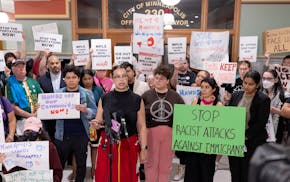Minnesota Attorney General Keith Ellison sued to block Trump's executive order ending birthright citizenship, joining counterparts in 21 other states in legal battles against a right they say is guaranteed by the Constitution and upheld by the Supreme Court.
"Only hours ago, the President swore an oath to uphold the Constitution, then broke it almost as soon as he took it," Ellison said in a statement on Tuesday. "I am using the power of my office and the law to join with other state attorneys general from coast to coast to quickly and clearly bring suit to stop this unprecedented, blatant breach of the Constitution by a President."
While the 14th Amendment says that all people born in the United States and subject to its jurisdiction are American citizens, Trump has sought to dismantle birthright citizenship as part of a sweeping crackdown on unlawful immigration.
On his first day back in office, Trump signed an executive order stating that the privilege of American citizenship does not automatically extend to someone born here when that person's mother was unlawfully present in the U.S. and the father was not a citizen or lawful permanent resident at the time of birth. The order also states that birthright citizenship does not apply when a person's mother was here lawfully but under a temporary status — such as a tourist or student visa — and the father was not a citizen or lawful permanent resident.
Such children, Trump argued, are not "subject to the jurisdiction" of the U.S. and no federal agency or department shall issue documents recognizing their citizenship — starting with people born in America after 30 days of the executive order.
Ellison joined a suit in U.S. District Court in Massachusetts asking the court to invalidate the order and block any actions to carry it out. Other plaintiffs are New Jersey, Massachusetts, California, Colorado, Connecticut, Delaware, Hawaii, Maine, Maryland, Michigan, Nevada, New Mexico, New York, North Carolina, Rhode Island, Vermont, Wisconsin, the District of Columbia and the city and county of San Francisco. The states of Arizona, Illinois, Oregon and Washington filed the same lawsuit in U.S. District Court for the Western District of Washington.
The legal action cited the Supreme Court's 1898 decision in U.S. v. Wong Kim Ark establishing that a child born in America to Chinese nationals living in the U.S. was automatically a U.S. citizen under the 14th Amendment. Congress codified that right in 1952 under the Immigration and Nationality Act.
The latest suit claimed that those stripped of citizenship "will be grievously harmed," affecting over 150,000 children nationally in a year. Plaintiffs raised concerns that children born after the executive order takes effect will lose the ability to access various federal services available to fellow Americans, along with their rights to work, vote, serve on juries and run for certain offices.
The suit noted that the order will also lead to cuts in federal funding on which plaintiffs rely to provide essential services to vulnerable children, such as health care access, foster care services and — as required by the U.S. Individuals with Disabilities in Education Act — certain early intervention and special education services to infants, toddlers and students with disabilities regardless of immigration status.
Ellison said the order would cause Minnesota and other states to lose federal funding to programs that they administer, such as Medicaid, the Children's Health Insurance Program and foster care and adoption-assistance programs that are all linked to the immigration status of the residents served.
States would be required, he said, to immediately begin modifying their operation and administration of benefits programs to account for the change — at considerable taxpayer expense.

How the federal raid unified the fractious Minneapolis City Council against Trump, sort of
Trump travel ban 'cruel,' Minnesota advocacy group says

Minneapolis City Council lowers street food cart license fee, hoping fruit sellers will hawk legally

No verdict after first day of jury deliberation in Derrick Thompson murder trial for crash that killed 5

